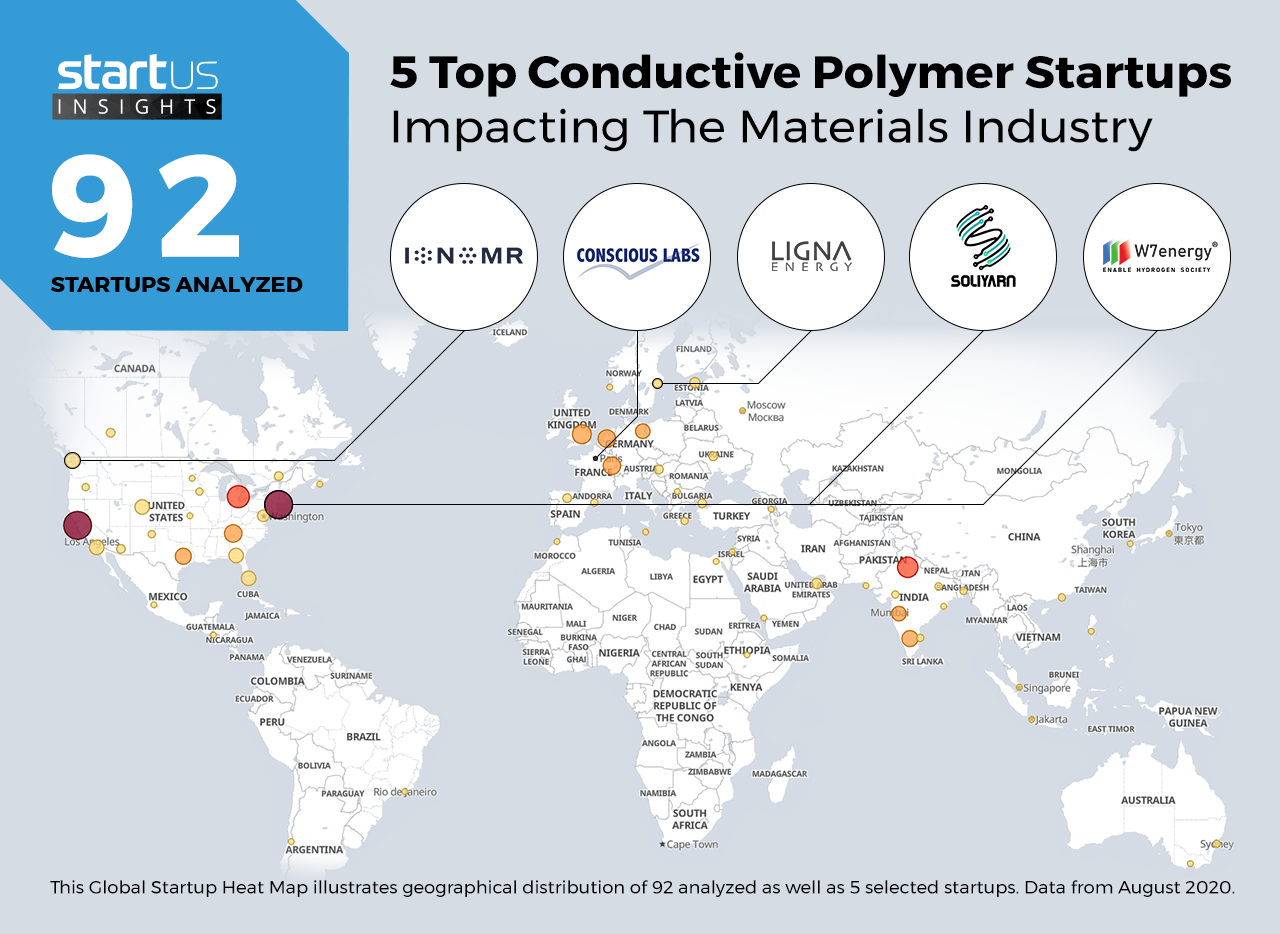Our Innovation Analysts recently looked into emerging technologies and up-and-coming startups working on solutions for the materials sector. As there is a large number of startups working on a wide variety of solutions, we want to share our insights with you. This time, we are taking a look at 5 promising conductive polymer startups.
Heat Map: 5 Top Conductive Polymer Startups
Using our StartUs Insights Platform, covering 1.116.000+ startups & emerging companies, we looked at innovation in the field of materials. For this research, we identified 92 relevant solutions and picked 5 to showcase below. These companies are chosen based on a data-driven startup scouting approach, taking into account factors such as location, founding year, and relevance of technology among others. Depending on your specific criteria, the top picks might look entirely different.
The Global Startup Heat Map below highlights 5 startups & emerging companies developing innovative conductive polymer solutions. Moreover, the Heat Map reveals regions that observe a high startup activity and illustrates the geographic distribution of all 92 companies we analyzed for this specific topic.
Ionomr – Ion-Exchange Materials
Traditionally, fluoropolymers serve in multiple highly specialized functions in materials, semiconductors, telecommunication, automotive, and aerospace. Due to their unique electrical properties, they also find applications in ion-exchange membranes for cleantech solutions. However, the production, use, and disposal of these resins harm the environment, which encourages startups to find sustainable materials.
Canadian startup Ionomr offers products for cleantech and circular economy. The startup develops polymer-based ion-conductive materials for applications in fuel cells, advanced energy storage, and on-site chemical recovery. Other than high ionic conductivity, Ionomr’s solutions also have a long lifetime, lower per-unit cost, and are environmentally non-toxic.
Ligna Energy – Sustainable Battery
Conductive polymers are cost-effective, have high conductivity, are lightweight, and possess excellent electrochemical properties. These characteristics make them suitable for use in energy storage applications. In particular, startups are exploring conductive bio-based polymers for energy storage use cases in a closed-loop economy.
Swedish startup Ligna Energy develops a sustainable battery solution. Their manufacturing process combines water-based electrolytes with organic polymers and biopolymers such as carbon, cellulose, and lignin from the forest. This allows fossil-free energy production while minimizing the overall negative life cycle impact. This sustainable solution finds applications in residential solar, electrical vehicle (EV) fast-charge stations, and grid frequency control.
Soliyarn – Conductive Textile
Many smart clothing solutions feature sensors or other electronic components. However, the use of conventional conducting materials in smart textiles suffers from many limitations. These include a significant impact on how the fabric feels, lack of breathability due to thick coatings, and oxidation of metallic fibers on exposure to water.
The US-based startup Soliyarn works on a proprietary technology that makes fabrics conductive. The startup uses a reactive vapor deposition (RVD) process to coat any fabric with a conductive polymer. Also, this coating is very lightweight and does not affect the feel, flexibility, or breathability of the fabric.
W7energy – Hydrogen Economy
The hydrogen economy seeks to replace hydrocarbon-based fossil fuels with hydrogen as the fuel. It also involves technologies for storage and transport of hydrogen energy. Conductive organic polymers enable significant improvement, offering polymer-based solar cells and other technologies.
The US-based startup W7energy develops a technology platform for conductive polymers. The startup’s PiperION polymers offer high ion conductivity, alkaline stability, mechanical strength, and low-cost production. They form the basis of advanced hydroxide exchange membranes and ionomers for diverse applications such as clean hydrogen production, flow batteries, and carbon dioxide reduction.
Conscious Labs – Polymer Sensors
Conductive polymers are easy to synthesize and are sensitive to a range of analytes. This makes them useful for applications, in both sensors and biosensors. The sensitivity is tunable and the response modifies the polymer structure. Sensing polymers find use in gas sensors, pH sensors, humidity sensors, ion-selective sensors, as well as in wearable electroencephalograms (EEG).
French startup Conscious Labs offers dry polymer sensors for brain-computer interfaces (BCI). The solution is a solid polymer with high ionic conductivity that eliminates the need for pointy electrodes for miniaturized electronics. Additionally, the solution turns any wearable EEG, including headphones, earbuds, augmented reality (AR) glasses, and virtual reality (VR) headsets, into a BCI.
What About The Other 87 Solutions?
While we believe data is key to creating insights it can be easy to be overwhelmed by it. Our ambition is to create a comprehensive overview and provide actionable innovation intelligence that enables you to achieve your goals faster. The 5 conductive polymer startups showcased above are promising examples out of 92 we analyzed for this article. To identify the most relevant solutions based on your specific criteria, get in touch.









